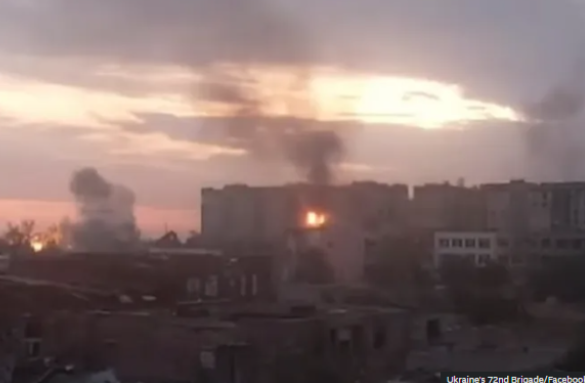Vuhledar has been under defense by Ukrainian forces since the onset of Moscow’s full-scale invasion.
Analysts from DeepState, a well-known organization that tracks frontline developments in Ukraine, report that Russian forces have captured the city, although this has yet to be officially confirmed. For over two years, Russia has aimed to take Vuhledar to push further north and access key regional transportation hubs like Kurakhove and Pokrovsk.
Pro-Kremlin military bloggers have shared multiple videos showing Russian soldiers placing flags on the rooftops of various buildings in Vuhledar.
On Tuesday, Donetsk regional authorities acknowledged that Russian troops had nearly reached the city center, while some reports indicate that Ukrainian forces are still holding on in certain districts.
The BBC spoke with two soldiers from the 72nd brigade who managed to escape the city prior to the final assault and have since taken up new positions in the area. They stated, “Our troops have withdrawn from the city.”
In recent days, Ukrainian soldiers had to find their own way out of Vuhledar on foot, as evacuation was impossible otherwise, said a machine-gunner who preferred to remain anonymous.
“Many were wounded and killed by Russian drones and artillery as they tried to leave,” another soldier named Roman reported. “Many more are still missing.”
Since the full-scale invasion began in February 2022, Moscow has launched numerous assaults to capture Vuhledar, all of which have failed until now. Last year, one of the largest tank battles took place there.
Rather than launching direct assaults, the Russian army has recently reverted to its preferred tactic of advancing along the flanks to encircle their target. Last month, they captured the village of Prechystivka to the west and Vodyane to the east, completing a pincer movement.
Moscow’s significant advantage in weapons and troop numbers—some soldiers have estimated the force ratio to be seven to one—allowed them to breach Ukrainian defense lines along the flanks and close in on Vuhledar.
Since the onset of the full-scale invasion in February 2022, Moscow has attempted numerous attacks to capture the city, all of which had failed until now. Last year witnessed one of the largest tank battles there.
The situation grew dire for the city when Russian forces effectively severed the last remaining lifeline route—the road from Vuhledar to Bohoyavlenka. Russian troops advanced so close that their artillery and kamikaze drones targeted anyone and anything moving on that road.
“We tried to send supplies and organize the evacuation of our wounded and dead soldiers, but it was all in vain,” Roman recounted. “We lost several vehicles and had to halt those operations.”
By Tuesday, only about 100 civilians remained in Vuhledar, down from a pre-war population of 14,000, as reported by Donetsk regional head Vadym Filashkin.
“Thank God we evacuated all the children. As for the 107 people still there, it’s difficult to reach them and provide humanitarian aid, drinking water, and medicine because an active stage of war is ongoing,” he stated.
The situation escalated when Russian troops entered the city, prompting Ukrainian units to start retreating without waiting for a formal withdrawal order.
“If a withdrawal isn’t organized, it ends up being chaotic,” explained a machine-gunner. Ukrainian defenders were like Titans trying to hold back the Russians, he noted. However, some units had become completely disoriented due to a communication blackout. With their radios down and under heavy fire, they were forced to make quick decisions, often opting to retreat.
Ukrainian defense lines were devastated by Russia’s aerial bombardments and thermobaric weapon systems, such as the Solntsepek heavy flamethrower, along with drones and multiple rocket launchers. Facing such relentless attacks, withdrawing from certain positions became inevitable, Roman asserted. “You either die or retreat.”
However, escaping from a city that was nearly surrounded was incredibly perilous. During the day, it felt like a suicide mission.
Ukrainian troops primarily attempted to escape at night, navigating through minefields using designated paths to avoid roads that were closely monitored by the Russians.
“Until recently, evacuation vehicles could drive in under the cover of darkness with their headlights off,” Roman explained. “But once Russian troops reached the city center, the only option left was to flee on foot.”
Those who managed to escape are feeling exhausted and depressed, as well as angry at their commanders for not ordering an earlier retreat. They believe it had been apparent for some time that Ukrainian forces would struggle to hold the city for long.
“I don’t know why [they didn’t give the order],” the machine-gunner expressed. “Maybe it’s fear of the military leadership, or perhaps it was an order from the top to hold our positions with our blood until the very end.”
Military officials from the 72nd Brigade and Ukraine’s operational command in the area declined the BBC’s request for comment.
In their latest daily briefings, the military’s General Staff remained silent on the situation in Vuhledar. The briefing on Wednesday morning simply stated that “the enemy launched unsuccessful attacks on our positions in Bohoyavlenka’s direction,” without mentioning Vuhledar at all.



